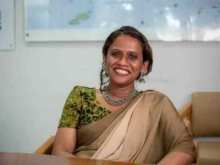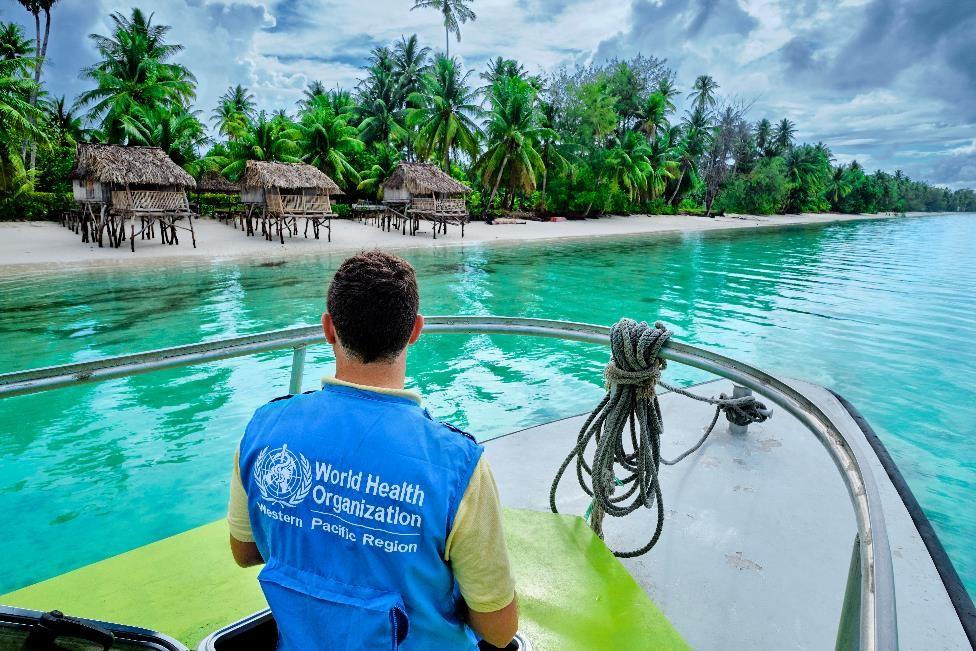Pacific island countries and areas are seizing the opportunity presented by the COVID-19 pandemic response to strengthen mental health coordination, governance, service provision and community mental health interventions.
The COVID-19 pandemic has generated mental health challenges among people across Pacific island countries and areas, and at the same time has caused disruption to mental health services, especially at community level.
Through increased awareness and social capital, communities will have a better understanding of mental health increased access to the mental health support and care they need, and improved health and wellbeing.
WHO has coordinated with a range of partners to support Ministries of Health across 21 Pacific island countries and areas in strengthening mental health services within primary health care and the community.

“Mental health work during COVID-19 has highlighted the importance of ensuring that health systems at all levels are equipped to recognize mental health conditions and are able to provide support... We hope to see more investment and action towards mental health so together we can achieve a fairer, healthier world and the attainment of universal health coverage.”

“This will help our staff to offer psychosocial support to the community during this COVID-19 outbreak and prepare them for possible support needed as we come into cyclone season.”

“Mental health is an issue in Kiribati because of stigma, there is a lack of understanding. People believe mental health is a spiritual issue and needs to be treated with magic.”
“We believe this helps communities to come seek help early, and to know more about mental health.”
THE LONG READ
It was a special day on Abemama Island when community leaders gathered in the ‘maneaba’, the meeting house at the heart of every community in Kiribati. Tekinano Karereiti, a primary health care worker, was facilitating a discussion about mental health. Community dialogue, the practice of listening and talking to each other on important issues, is deeply grounded in the history and culture of the Pacific Islands and this was a good opportunity to raise awareness of an increasingly important issue for islanders.
“Mental health is an issue in Kiribati because of stigma, there is a lack of understanding. People believe mental health is a spiritual issue and needs to be treated with magic,” Tekinano explained.
The session focused on what could be done to prevent mental illness, how to look after your own and others’ well-being, and what community leaders can do to identify and refer people who need support to the mental health team on the main island of South Tarawa. Community members play a central role in helping improve understanding of and managing mental health issues in the country.
In Kiribati, a country with a population of just over 119 000, communities experience many stressors, including the COVID-19 pandemic and climate change. Strict control over entry to the country and measures to reduce the risk of transmission of COVID-19 have resulted in lost income and separation from loved ones, which has taken its toll on the population.
Rising sea levels as a result of climate change have caused more frequent flooding, meaning the few edible plants that grow on the atoll die and the fresh drinking water wells become very salty. This has led to food and water shortages on the outer islands, leading people to move to the main island, which has subsequent issues of over-crowding and economic hardship.
The village meeting was part of a series of mental health awareness-raising sessions and trainings provided by the Ministry of Health in Kiribati and based on WHO’s mental health gap action (mhGAP) programme. The series was made possible through a WHO Division of Pacific Technical Support facilitated mhGAP Training of Trainers course, supported through the UHC Partnership.
Tekinano Karereiti was one of seven mental health professionals in Kiribati who completed the mhGAP Training of Trainers course, which took place online December 2020 – March 2021. The participants have since trained nearly 200 nurses, nurse aides, police officers, village security personnel, church members and others working in schools in mental health identification and management , both on the main island and 3 outer islands.
“We believe this helps communities to come seek help early, and to know more about mental health,” said Dr Arite Katherine, head of the department of mental health, Tungaru Central Hospital in South Tarawa.
Following the trainings, the Ministry of Health has seen a reduction in the referral of people with chronic mental illness to the mental health department at Tanguru Central Hospital. Going forward, the mental health team plans to continue building resilience in communities to support mental health.

WHO mental health support across the Pacific
WHO, through the UHC Partnership, supports Ministries of Health in 21 Pacific island countries and areas to strengthen mental health service provision, which is particularly important during the COVID-19 pandemic. All surveyed Pacific island countries and areas reported disruption to one or more of their mental health services since the COVID-19 pandemic began (WHO, 2020). The greatest disruption has been to community-based activities and services for vulnerable groups. These include school mental health programmes, caregiver interventions and outreach services, ante- and postnatal services and services for young people and older adults.
Pacific island countries and areas are among the 115 countries and territories to which the UHC Partnership helps deliver WHO support and technical expertise in advancing UHC with a primary health care approach. The Partnership is one of WHO’s largest initiatives for international cooperation for UHC and primary health care. We thank the European Union, the Grand Duchy of Luxembourg, Irish Aid, the French Ministry for Europe and Foreign Affairs, the Government of Japan – Ministry of Health, Labour and Welfare, the United Kingdom – Foreign, Commonwealth & Development Office, Belgium, Canada and Germany for their funding support to the UHC Partnership.

Adapting support to integrate mental health into primary care during COVID-19
WHO has adapted its approach to scale up mental health services in primary health care during COVID-19. WHO provides training, supervision and health systems strengthening support to equip nominated nurses and other providers working in primary health care to identify and conduct basic management of mental health conditions, as well as to make referrals to higher level care when needed. This means that many more people will receive appropriate care and psychosocial support for mental health conditions such as depression, psychosis and epilepsy, than would otherwise be the case.
WHO support for integrating mental health into primary health care is traditionally rolled out through face-to-face workshops, trainings and consultations across the Pacific island countries and areas. Regular refresher trainings, supervision and follow-up then take place.
Due to the COVID-19 situation, WHO support has taken place online for the first time: training workshops over video conference took place in Cook Islands, Kiribati and Marshall Islands; three online self-directed training courses are being created and adapted for the Pacific island countries; and WHO is hosting monthly online information-sharing webinars for mental health focal points so that Pacific island countries can learn from and support each other in responding to mental health during COVID-19.

Coordination of mental health support during COVID-19
In January 2020, WHO set up the COVID-19 Pacific Joint Incident Management Team, which brings together international organizations at the sub-regional level to coordinate the health response to COVID-19. The Mental Health and Psychosocial Support cell under the Joint Incident Management Team is led by WHO, enabled by the UHC Partnership, and includes representation from UNICEF, the United Nations Population Fund (UNFPA), UN Women, the International Federation of Red Cross and Red Crescent Societies (IFRC) and the (SPC).
The group aims to support Ministries of Health across the Pacific to prepare and respond to the mental health impacts of COVID-19 and to coordinate activities. To date, they have created mental health guidance and materials, which were shared widely with Ministries of Health and people working in the social protection and education sectors. This has resulted in more partners taking on the issue of mental health and investing resources accordingly, and has allowed for mental health to be streamlined across multiple sectors.


Supporting health care workers to respond to mental health during COVID-19
“Mental health work during COVID-19 has highlighted the importance of ensuring that health systems at all levels are equipped to recognize mental health conditions and are able to provide support,” said Dr Mark Jacobs, Director of Pacific Technical Support and WHO Representative to the South Pacific. “Finding ways to strengthen the capacity of all health care workers to recognize and respond to both their own and others’ stress during the COVID-19 has been a particular priority in the Pacific.”
Brief online trainings have been provided on basic psychosocial support (identification and referral) to healthcare staff with no prior training in mental health. For example, in Fiji, WHO, in collaboration with the Ministry of Health, trained approximately 300 primary health care practitioners virtually in psychological first aid over multiple sessions.
“This will help our staff to offer psychosocial support to the community during this COVID-19 outbreak and prepare them for possible support needed as we come into cyclone season,” said Dr Devina Nand, from the Ministry of Health, Fiji.
Supporting health staff to look after their own emotional well-being, allowing them to continue doing their jobs to the best of their ability and avoid burnout, has also been a priority. WHO provided training on self-care to over 50 participants from the Emergency Medical Teams in the Pacific and to 28 staff working in COVID-19 facilities in Fiji.

Seeing impact across the Pacific
Everyone has the right to health, and mental well-being is integral to enabling people to lead healthy and fulfilling lives. While COVID-19 has generated various mental health challenges among communities in the Pacific Islands, it has also opened up opportunities for countries to increase access to mental health services and reduce the stigma. The impact of training health workers and promoting the importance of good mental health and well-being in communities is already being felt.
For example, health workers across the Pacific are reporting greater awareness and understanding among community members. Mental health teams across the Pacific Islands have reported receiving an increase in referrals due to the increased identification of mental illness in primary health care and community. As a result more people are accessing the care they need.. The increase in understanding of mental health conditions, coupled with primary health care that is better able to address peoples’ mental health needs, are expected to have long-term benefits for individuals, families and communities as a whole.
“The efforts of health workers across the Pacific to integrate mental health services into primary health care during the pandemic is commendable,” added Dr Jacobs. “We hope to see more investment and action towards mental health so together we can achieve a fairer, healthier world and the attainment of universal health coverage.”
______________________________________________________________________________________________________________________________________________________________________
Pacific island countries are strengthening their health systems to protect their populations from all health emergencies.
Pacific island countries have been actively demonstrating their commitment to developing and strengthening their pandemic preparedness and health security capabilities to mitigate the disruptions caused by health emergencies on their health systems, including mental health services. The Governments have repeatedly volunteered to take part in the Joint External Evaluation (JEE) of their capacities to prevent, detect and respond to health emergencies. The results of the JEE’s are often also used to help develop the National Action Plan for Health Security.
To learn more, visit WHO’s Strategic Partnership for Health Security and Emergency Preparedness (SPH) Portal.
